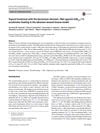 1 citations,
January 2024 in “NPJ breast cancer”
1 citations,
January 2024 in “NPJ breast cancer” Experts agree on how to manage sugar levels and skin reactions in patients taking the cancer drug alpelisib.
23 citations,
December 2013 in “Molecular cancer therapeutics” Breast cancer treatments work better with AR activation, improving results and reducing side effects.
7 citations,
August 2017 in “Journal of dermatological science” Sorafenib causes skin reactions by increasing the number and activity of skin mast cells.
 4 citations,
December 2022 in “Advanced science”
4 citations,
December 2022 in “Advanced science” SCD1 is important for hair growth by keeping the connection in skin cells where hair stem cells live stable.
 1 citations,
January 2022 in “European Journal of Pharmacology”
1 citations,
January 2022 in “European Journal of Pharmacology” Riboflavin 5′-phosphate (FMN) shows potential for treating androgen-related conditions but may be limited in treating prostate cancer.
December 2022 in “Molecular Pharmaceutics” Latanoprost-loaded nanotransfersomes could help treat hair loss by promoting hair growth.
 22 citations,
July 2014 in “Hormones”
22 citations,
July 2014 in “Hormones” Metformin may help treat neuroendocrine tumors.
 September 2018 in “Fertility and Sterility”
September 2018 in “Fertility and Sterility” High levels of testosterone and anti-Müllerian hormone before pregnancy are linked to a higher risk of newborns needing intensive care.
 31 citations,
February 2019 in “International Journal of Cosmetic Science”
31 citations,
February 2019 in “International Journal of Cosmetic Science” Caffeine applied to the scalp can protect hair follicles from UV damage.
 3 citations,
October 2018 in “Archives of Dermatological Research”
3 citations,
October 2018 in “Archives of Dermatological Research” Applying InlB321/15 to wounds sped up healing in mice.
 46 citations,
September 2014 in “Steroids”
46 citations,
September 2014 in “Steroids” Plant steroid hormones show growth, health, and medicinal benefits in various organisms, including potential for treating diseases.
 27 citations,
July 2017 in “European Journal of Dermatology”
27 citations,
July 2017 in “European Journal of Dermatology” Certain microRNAs are linked to various skin diseases and could be used to diagnose and treat these conditions.
 March 2024 in “Frontiers in genetics”
March 2024 in “Frontiers in genetics” Different types of fibroblasts play specific roles in wound healing and cancer, which could help improve treatments.
 39 citations,
January 2013 in “Indian Journal of Dermatology, Venereology and Leprology”
39 citations,
January 2013 in “Indian Journal of Dermatology, Venereology and Leprology” Eating high glycemic foods and drinking milk may worsen acne by increasing insulin and IGF-1 levels.
 195 citations,
November 2019 in “Clinica Chimica Acta”
195 citations,
November 2019 in “Clinica Chimica Acta” High levels of male hormones, insulin resistance, and obesity are closely linked and worsen polycystic ovary syndrome, but more research is needed to improve treatments.
 70 citations,
October 2020 in “The journal of allergy and clinical immunology/Journal of allergy and clinical immunology/The journal of allergy and clinical immunology”
70 citations,
October 2020 in “The journal of allergy and clinical immunology/Journal of allergy and clinical immunology/The journal of allergy and clinical immunology” Janus kinase inhibitors are promising drugs for treating autoimmune and inflammatory diseases.
 40 citations,
January 2013 in “Journal of Korean Medical Science”
40 citations,
January 2013 in “Journal of Korean Medical Science” Iron deficiency may contribute to hair loss.
 11 citations,
November 2015 in “Journal of Functional Foods”
11 citations,
November 2015 in “Journal of Functional Foods” Hibiscus petals improved blood sugar and stress responses in diabetic rats.
 7 citations,
October 2019 in “Annals of palliative medicine”
7 citations,
October 2019 in “Annals of palliative medicine” New targeted cancer drugs can cause skin side effects, and managing them requires patient education and timely care.
 December 2023 in “Journal of nutritional science and vitaminology”
December 2023 in “Journal of nutritional science and vitaminology” A zinc-deficient diet stunted growth and affected organs in mice, with C57BL/6J mice showing more severe symptoms.
 January 2019 in “Springer eBooks”
January 2019 in “Springer eBooks” Acne is linked to inflammation and insulin resistance, and is associated with various syndromes that require different treatments.
 January 2017 in “Brazilian Journal of Pharmaceutical Sciences”
January 2017 in “Brazilian Journal of Pharmaceutical Sciences” Arteannuin might work against cancer and Alzheimer's by targeting neprilysin.
 99 citations,
December 2010 in “Journal of The European Academy of Dermatology and Venereology”
99 citations,
December 2010 in “Journal of The European Academy of Dermatology and Venereology” The document concludes that certain genetic mutations and dietary factors are involved in acne development, and treatments like isotretinoin and diet changes can help manage it.
 67 citations,
February 2020 in “Journal of Ginseng Research”
67 citations,
February 2020 in “Journal of Ginseng Research” Korean Red Ginseng has beneficial components that help with stress, immunity, fatigue, memory, blood flow, and disease protection.
 38 citations,
June 2015 in “Expert Opinion on Therapeutic Targets”
38 citations,
June 2015 in “Expert Opinion on Therapeutic Targets” Blocking the prolactin receptor might help treat various diseases, but more research is needed.
 25 citations,
November 2012 in “Phytotherapy Research”
25 citations,
November 2012 in “Phytotherapy Research” Crataegus pinnatifida extract may help increase hair growth and thickness in mice.
 6 citations,
September 2020 in “Advanced Biology”
6 citations,
September 2020 in “Advanced Biology” Blue-light activation of TrkA improves hair-follicle stem cells' ability to become neurons and glial cells.
 2 citations,
January 2018 in “Elsevier eBooks”
2 citations,
January 2018 in “Elsevier eBooks” Targeted therapies for lung cancer are effective but require careful management of side effects to benefit patients.

Mesenchymal stem cell-derived exosomes significantly increase hair density and thickness in androgenic alopecia patients.
 September 2023 in “bioRxiv (Cold Spring Harbor Laboratory)”
September 2023 in “bioRxiv (Cold Spring Harbor Laboratory)” FOL-026 peptide can help repair blood vessels and promote growth, offering potential treatment for vascular diseases.



























